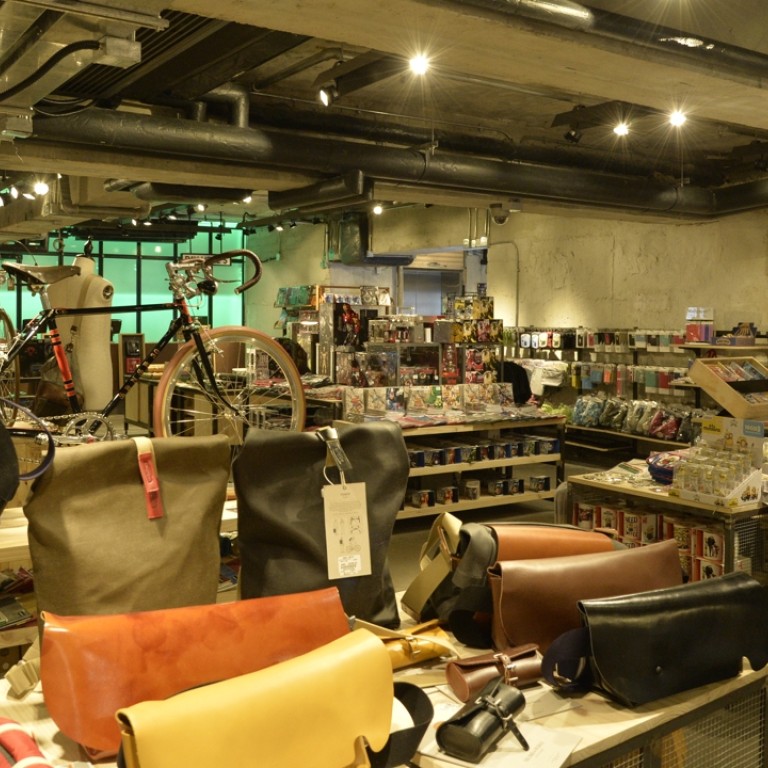
‘HMV is getting an upgrade in Hong Kong’: Buyer explains how he turned around failing business in two years and why vinyl is back
Within just two years of buying British music retail brand HMV’s businesses in Hong Kong and Singapore, Kelvin Wu, co-founder of private equity firm AID Partners, has turned the struggling brand into a profitable business by reinventing it as a lifestyle brand.
The company plans to officially launch its three-storey, 40,000-square-feet (3,716-square-metre) flagship lifestyle store in Hong Kong’s busy Causeway Bay on Friday. The store had a soft opening at the end of last month.
In between relaxing at its bar and restaurant, customers can purchase products such as headphones, bags, books, magazines and even drones on top of HMV’s usual offerings of CDs, DVDs and vinyl.
Although now a prominent business figure in Hong Kong, Wu hails from the Chinese mainland. He moved to the city as a child and grew up in a slum in Kwun Tong.
Wu discussed this and other issues, including his aspirations for the HMV brand, in a recent interview with the South China Morning Post’s Zen Soo.
What kind of childhood did you have?
I was born on Hainan Island, but I grew up speaking the Teochew dialect as my father hails from Shantou in [southern] Guangdong province. When I was 11, my family moved to Hong Kong. Moving there was a dream shared by many Chinese at that time.
In Hong Kong, I grew up dirt poor in a squatters’ hut in a slum area. I knew that education was the only option for me to crawl out from that life of poverty. I had to get a degree from university, so I studied hard, because I didn’t want to become a cook. Later I was admitted to the Chinese University of Hong Kong and I obtained a degree in business administration. I went on to pick up French at university. I now speak six languages – English, Mandarin, Cantonese, Teochew, Japanese and French.
What led you to establish AID Partners?
I think entrepreneurship is an inherent trait of the Teochew people. Since I was little, I was brought up with the mindset that I should aspire to become an entrepreneur. As your own boss, you can be creative – you have the ability to grow an enterprise in the way that you want.
With AID, we want to be a company that delivers a positive message to the community. AID Partners focuses on investment in the Hong Kong entertainment and media industry, because the film business is also cultural. Hong Kong has a dynamic and deep-rooted film culture in terms of entertainment, and has a very East-meets-West flavor to it. In particular, Hong Kong has long enjoyed the reputation of being the ‘Hollywood of the East’.
Why did you see HMV as a viable opportunity for AID Partners, especially as sales of physical CDs have been declining steadily?
The reason we acquired HMV is because it is a very strong brand. It represents a lot of history, culture, music and entertainment over the years. Since we are in the entertainment and media industry in Hong Kong, we wanted to own a brand that aligns with our philosophy.
I don’t think HMV could have sustained operations as it was, because physical products for digital items probably can’t survive if its destiny now is to be online. So we at AID Partners wanted to change it. We admit that CDs will gradually fade out, and CD sales decline each year. But right now there are also chances for analogue products to make a comeback, vinyl in particular.
We have seen a huge rebound in the vinyl market, because the sound quality from vinyl is better, and there is a nostalgic feel to it. And thanks to the affordability of ‘Made in China’ products such as high-fidelity speakers and turntables, younger consumers today are able to afford the quality of good music at a lower price.
This is why we have positioned ourselves as one of the big players in vinyl around the world. We are definitely the biggest in Hong Kong right now in terms of vinyl, and we hope to one day be the biggest in the world.
What other plans do you have for HMV? Are there any plans to expand outside of Hong Kong and Singapore?
We are also looking into developing ourselves as a label and signing up talented local artists to boost the music scene. We hope to scout future stars and perhaps send them to Korea for training.
Our flagship store in Causeway Bay that just launched is huge. It’s a very cool place to hang out. On the highest floor, we will have gaming consoles and a sports section for people to engage in both e-sports and real sports.
On the same level, there is a bar and restaurant where customers can enjoy fusion cuisine while listening to live music. The other two floors will be dedicated to music and entertainment products, as well as apparel and lifestyle items.
HMV may have originated in the UK, but it is getting an upgrade in Hong Kong. The flagship store is a place that still brings you back to pure music, but it is also a social gathering place instead of just a music content acquisition store.
In terms of international expansion, we currently hold the rights for HMV in China and Macau, and we are still in discussions for expansion in that region. Taiwan will also be an interesting move for us. Perhaps one day we will own the rights for HMV all over the world. Who knows?

